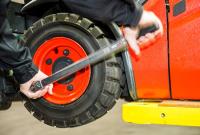 Add My Company
Add My Company
Sign In
A GUIDE TO FORKLIFT TYRES AND MAINTENANCE
10-01-2018

A Guide To Forklift Tyres And Maintenance
There’s a number of different forklift tyres available in the market today. Each type of tyre offers a significant variety in tread, compound and ply rating. You need to consider each variation when evaluating which tyre will work best for your application.
Also, keeping your forklift tyres in good shape will help reduce wear and tear, along with any stress on the transmission and the forklift driver. Proper tyre maintenance will significantly improve fuel efficiency – and help to improve overall safety.
When choosing your tyres
The most common types of tyres available for forklifts are solid or pneumatic, and there are generally two options to fitting them – press on or standard.
Tyres that are press on are often less durable, especially when they’re used across difficult terrain. Standard tyres are fitted the same way as if you’re fitting them to a car.
Always calculate the required load each wheel will be carrying before choosing your tyre size – selecting the tyre that supports the load with the lowest inflation pressure is recommended.
Take into account any conditions the forklift will potentially be working in, and how often it’s going to be used. A thicker pneumatic tyre is most suitable for rough, more damaging areas. While a solid, puncture proof rubber tyre is now commonly used indoors and on more even surfaces.
If your forklift is only going to be used indoors, then the best recommendation would be a cushion tyre – which are designed for smooth warehouse surfaces.
The standard and specialised tyres available
Cushion – Standard press on tyres used for smooth surfaces. The tyres have a small turning radius ideal for working in tight spaces.
Pneumatic – Thick and strong wear-resistant rubber tyres, with a deep tread. Filled with air, they provide a cushion effect between the forklift and the floor – extending the use of the forklift across rough and uneven ground.
Polyurethane – Designed for extremely heavy loads over short distances. They are chemical-resistant and hold their integrity very well.
Solid/Puncture Proof – The most common forklift tyre. Long lasting – they don’t puncture or go flat. Ideal for use indoors or for infrequent outdoor use on fairly smooth, even ground.
Fiberglass – These tyres have a much higher resistance to heat effects – well suited to making sure forklifts that have a heavy demand, last far longer.
Static-resistant – Tyres specifically designed to prevent static discharge. These tyres are best for use in facilities that handle materials that are highly combustible or explosive.
Non-marking – Solid tyres that are specially designed to prevent black marks on surfaces. They are required for food processing factories, but have a short lifespan due to the carbon black being removed from them.
Foam Fill – They are filled with a special resin that provides constant pressure, whilst preventing punctures.
Cold-prepped – When working on ground that builds up ice, causing slippage, like cement and flat surfaces – these tyres provide greater traction where necessary.
Pressure, driving and storing
Make sure the air pressure in your tyres is checked regularly to ensure that it’s always at the correct level. Keep in mind that heat buildup from extended use can increase the tyre pressure. Cover all caps and valves and don’t lower air pressure by bleeding, as it can increase the build up of heat.
Refrain from sudden braking or starting movements, cornering at excessive speed, or locking a wheel for tight turns – all can wear out your tyres quickly.
Tyres should be stored in a cool, dark and oil free area, avoid keeping them close to any active electric engines. Try to not store tyres for long periods of time – no longer than a few months.
Are you looking to purchase a new Forklift or used forklift? Why not give us a call today? 0800 298 8790
For more information on A GUIDE TO FORKLIFT TYRES AND MAINTENANCE talk to H and F Lift Trucks
Enquire Now
More Blogs
List your company on FindTheNeedle.

